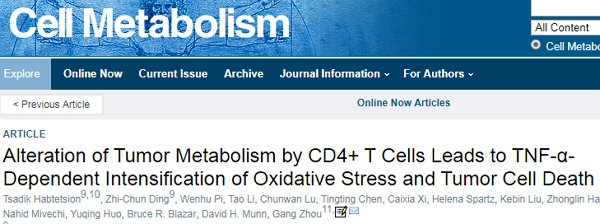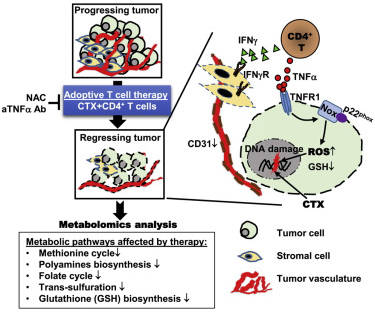Reactive oxygen species,ROS It is a natural product of aerobic metabolism and plays an important role in regulating physiological function and signal transduction. However, once ROS levels are abnormal, oxidative stress occurs, which is considered to be an important factor in aging and disease.
Unlike healthy cells, cancer cells need higher ROS levels to maintain their rapid division and proliferation. Recently, scientists from the Georgia Cancer Center and Medical College have developed an interesting cancer treatment strategy: increasing ROS concentrations to the critical point that causes cancer cell "load death". They developed an adoptive T cell therapy based on CD4 + T cells, which has been shown to increase ROS levels in tumor tissue and eventually lead to cancer cell death. Relevant research results are published in the Journal Cell Metabolism.
Immunotherapy "overfeeding" cancer cells?
In the new study, the team used mice with colorectal cancer as models and immunized mice after injecting chemotherapeutic drugs that support T cells. Subsequently, they found that the expression of glutathione, a natural antioxidant that helps balance ROS, was impaired in mice and that ROS accumulated in cancer cells.
At the same time, T cells also stimulate the expression of a series of cytokines, such as tumor necrosis factor alpha, which have pro-inflammatory effects. This study shows that TNF-a can directly act on tumor cells and stimulate ROS production in cells.
The results showed that almost all mice receiving the therapy had satisfactory results of tumor regression.
Tumor necrosis factor alpha ( TNF-α) is the key.
In addition to colorectal cancer, the team achieved similar success in breast cancer and lymphoma models.
In addition, the researchers found that tumor necrosis factor-alpha, which is increased by immunotherapy, can further increase oxidative stress and eventually destroy cancer cells in combination with chemotherapy.
"Thebasisof cancer cells is inherently high, and further disruption of their ability to process ROS would accelerate their death." "Tumor necrosis factor alpha disrupts the blood supply of tumor cells and prevents them from growing," the researchers explained.
Researchers note that cancer cells and T cells may compete for energy resources, which can have harmful effects on each other. Moreover, in many cases, T cells are at a disadvantage. These results indicate that enhancing tumor oxidative stress is a potential anticancer mechanism of immunotherapy.
Abebio developed ELISA kit
ROS,
TNF-α, with high sensitivity and stability, please contact us if you have any inquiry.
Cindy


